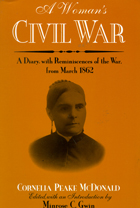
In the Shenandoah Valley campaign of 1864, U.S. Major General Philip H. Sheridan led his army to a series of decisive victories for the Union over Lieutenant General Jubal A. Early and the Confederate Army of the Valley. In From Winchester to Cedar Creek, author Jeffry D. Wert highlights Sheridan’s victories in the critical area of the Virginia Valley as defining moments of the Civil War. Sheridan’s campaign ensured Confederate defeat in Virginia and ultimately contributed to Lincoln’s reelection and the Union’s victory in the Civil War.
Drawing on manuscript collections and many published sources, Wert offers vivid descriptions of the battles of Third Winchester, Fisher’s Hill, Tom’s Brook, and Cedar Creek. The book also explores how the interplay of the strengths and weaknesses of the Union and Confederate commanders, Sheridan and Early, resulted in victories for Sheridan’s Army of the Shenandoah. Grounded in detailed research, Wert’s compelling narrative portrays the military strategies these commanders employed and how their tactical decisions impacted civilian sacrifice in the Valley.
First published in 1987, Wert’s chronicle remains the definitive book on Sheridan’s command and the Shenandoah Campaign of 1864. Offering a balanced treatment of both Union and Confederate experiences during the campaign, Wert emphasizes its importance as a turning point in the war from both military and civilian points of view.
Supplemented with situation maps and photographs, From Winchester to Cedar Creek not only documents and dynamically recounts the events that unfolded in the summer and fall of 1864 in the Virginia Valley, but it also details the political, strategic, and tactical forces that made the Shenandoah Valley campaign so important to the outcome of the Civil War.

McDonald’s story of the Civil War records a personal and distinctly female battle of her own—a southern woman’s lonely struggle in the midst of chaos to provide safety and shelter for herself and her children. For McDonald, history is what happens “inside the house.” She relates the trauma that occurs when the safety of the home is disrupted and destroyed by the forces of war—when women and children are put out of their houses and have nowhere to go.
Whether she is describing a Union soldier’s theft of her Christmas cakes, the discovery of a human foot in her garden, or the death of her baby daughter, McDonald’s story of the Civil War at home is compelling and disturbing. Her tremendous determination and unyielding spirit in the face of the final collapse of her world is testimony to a woman’s will to preserve her family and her own sense of purpose as a “rebel” against all that she regarded as tyrannical and brutal in war itself.
READERS
Browse our collection.
PUBLISHERS
See BiblioVault's publisher services.
STUDENT SERVICES
Files for college accessibility offices.
UChicago Accessibility Resources
home | accessibility | search | about | contact us
BiblioVault ® 2001 - 2024
The University of Chicago Press









